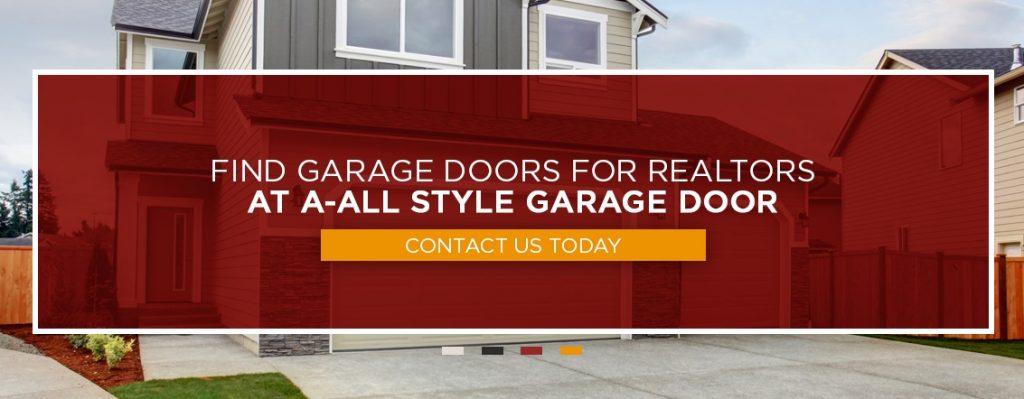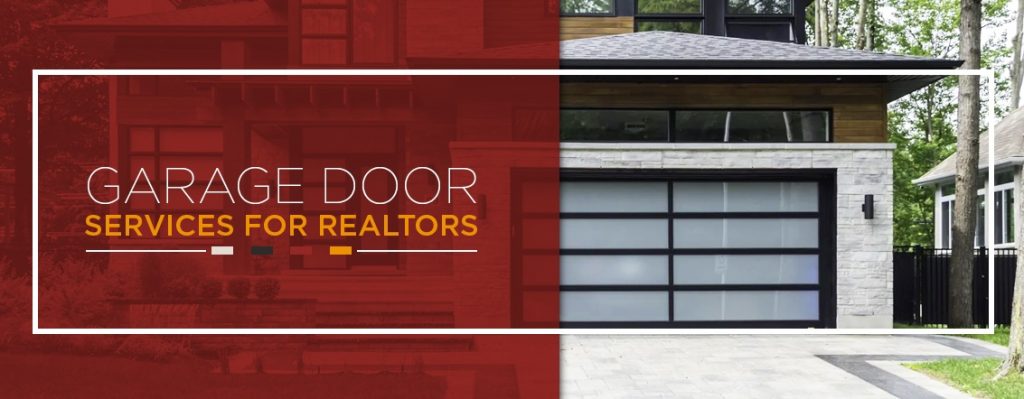
As a real estate agent, you know one of the best things a seller can do for their home is to boost its curb appeal. The first thing people see when they walk up to a home is the exterior, and the first impression a buyer gets can make or break a sale. While many people assume improving curb appeal means giving the home exterior a new coat of paint or sprucing up the landscaping, it can also include a garage door repair or replacement.
Depending on the size of a garage, the door can take up a considerable amount of the visible space on a home’s exterior. If the door has clearly seen better days, it can detract from what is otherwise a great house. Convincing a seller to upgrade or replace a garage door can make their home more attractive, lead to a quicker sale and possibly have a positive effect on the home’s sale price.
What You Need to Know About Garage Doors
When a seller is ready to put their home on the market, they may not consider how their garage door will affect the sale. This may be especially true if:
- The seller has already moved out of the home.
- The seller is now living in another city or state.
- The seller used the property as a rental.
- The seller never lived in the home.
A home inspector may uncover an issue with the garage door when completing an inspection for a potential buyer or the seller. If the seller knows about a problem with the garage door before they list the house, they need to state the issue as part of the seller’s disclosure.
As the real estate agent, you may want to encourage your client to inspect the garage door before listing the home and to fix or replace the door as needed. Knowing the types of problems garage doors commonly face and the basics of garage door materials and styles can help you make the most appropriate recommendations for your clients.
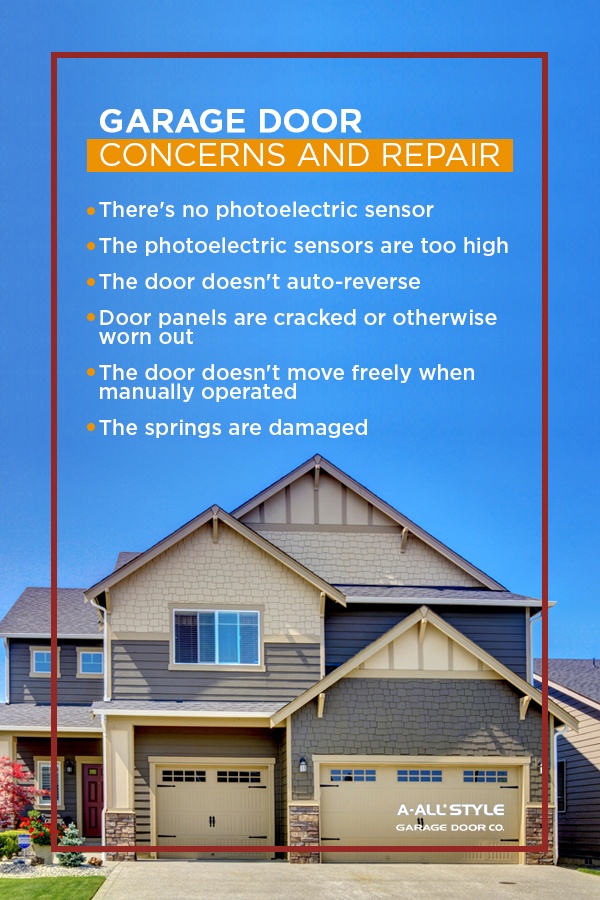
Garage Door Concerns and Repair
A garage door may fail an inspection for several reasons. You can recommend either repairing or replacing a garage door or opener, if you identify one of the following causes for concern:
- There’s no photoelectric sensor: If the garage door opener is over 25 years old, it might not have photoelectric safety sensors installed. Photoelectric sensors stop the door from closing when an object blocks them. The sensors have been a standard since 1992, but it’s possible an older garage door may not have been updated.
- The photoelectric sensors are too high: Photoelectric sensors need to be no more than 6 inches off the ground to work effectively. If they are higher than that, they may not be able to detect small objects or animals that roll or run under a garage door as it closes.
- The door doesn’t auto-reverse: Even older garage doors without sensors should have an auto-reverse feature to pull the door back up if it comes into contact with something. A door that doesn’t auto-reverse and completely return to the open position can be a serious safety hazard.
- Door panels are cracked or otherwise worn out: Along with checking for safety features, a home inspector will also examine the condition of the garage door. A garage door that has cracked, separating, worn or fatigued panels may not pass the inspection.
- The door doesn’t move freely when manually operated: A garage door should have handles that are easy to grip. It should also be easy to open the door manually once it’s disconnected from the operator.
- The springs are damaged: The springs on a garage door need to be intact and in good working order for it to pass inspection. A door with damaged springs is a safety hazard.
Depending on what the inspector finds, you may recommend that your client completely replaces the garage door or opener, or that they repair it. For example, if the photoelectric sensors aren’t in the right position, it is often simple to lower them. In the case of a very old door or a door that has significant signs of wear, replacement is often the best choice.
If your client is hesitant to make any improvements to the door, it can be a good idea to point out that not fixing the issues can delay the sale. If a buyer is interested in the home but the inspector finds problems with the door, the buyer can walk away if the seller doesn’t negotiate or refuses to fix the problems. Being proactive about the garage door can help you and the seller streamline the sale process.
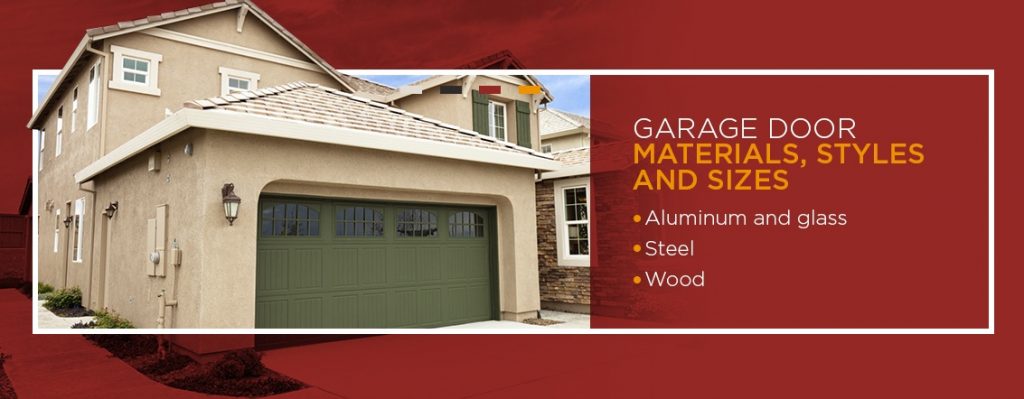
Garage Door Materials, Styles and Sizes
Along with knowing the potential issues a garage door can have, it helps to know what sorts of materials, styles and sizes are available for garage doors. The materials commonly used for garage doors include:
- Aluminum and glass:Aluminum and glass garage doors let light shine into the garage. They still provide some privacy as the homeowner can choose a desired transparency level for the glass.
- Steel: Steel is one of the most popular materials for garage doors — for a good reason. It’s sturdy, available in a wide range of colors and easy to maintain. If a seller wants to replace an existing garage door with a steel door, they will have many options.
- Wood:Wood doors have a warmth and beauty that appeals to many homeowners and buyers. Although wood typically requires more effort to maintain, it can be the right choice for certain types of homes.
The style of a garage door should complement the style of the seller’s home. For example, a modern or contemporary home will most likely work well with a trendy glass and aluminum garage door. A Victorian home will usually pair well with a carriage house style door. Windows can be a good feature to have on a variety of door styles, as they add light to the garage. If the windows are high enough on the door, they can still allow for privacy.
Another conversation you may want to have with a home seller concerns the size of the garage door. Standard door sizes usually range from 8 or 9 feet wide by 7 feet high for one-car garages to 16 feet wide by 7 feet high for two-car garages. Custom door sizes are available, as well. If your clients aren’t living nearby, you may need to go to the house and measure the garage door yourself to confirm its size. When measuring the width and height of a door, measure within the frame.
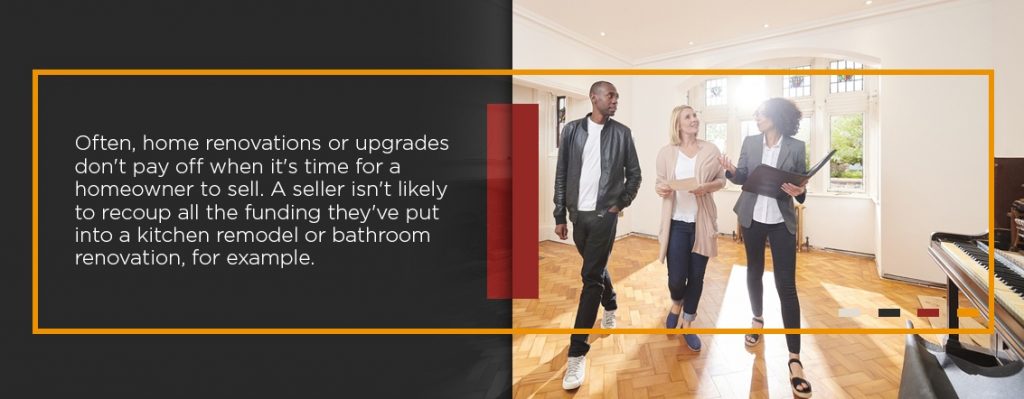
Garage Doors Can Improve Resale Value
There are several reasons you may recommend new garage doors for home sales. One of the biggest reasons for an upgrade is that replacing an older, worn-out or damaged garage door can have a significant effect on the resale value of a home.
Often, home renovations or upgrades don’t pay off when it’s time for a homeowner to sell. A seller isn’t likely to recoup all the funding they’ve put into a kitchen remodel or bathroom renovation, for example. Some remodeling projects have a bigger pay off than others — including replacing a garage door.
According to the 2020 Cost vs. Value report, it cost $3,695 to:
- Remove and dispose of an old 16-by-7-foot garage door and its tracks.
- Install a heavy-duty, 16-by-7-foot steel garage door with windows and new tracks.
The value of the replacement door when the home sells is estimated to be $3,491, allowing the seller to recoup 94.5% of the cost. Keep in mind that the price for each garage door replacement may vary based on the size of the door, the chosen material and more.
Installing a new garage door isn’t just a sound investment for a homeowner who’s eventually hoping to sell. It can also help the home sell more quickly once it’s on the market and might lead to a higher sale price. Around 70% of real estate agents believe a new garage door helps speed up the sale of a home, while more than 80% believe a garage door can affect the sale price of a home.
Garage Doors Can Improve Curb Appeal
One of the first things potential buyers see when they come to view a home is the garage door. Whether the garage holds one car, two cars or has custom dimensions, it takes up a considerable amount of space on the front of a home. Some garage styles, like those on a snout house, are more prominent and extend across the facade of the house. When you’re trying to make a sale, the last thing you want is for a buyer to turn around and leave without looking at the inside of a home because they aren’t impressed with what they see outside.
Convincing the seller to update their garage door can do wonders for the curb appeal of the home. Some things to consider when upgrading the garage door include:
- Switching to a lower-maintenance material: Some garage door materials are easier to care for and lower maintenance than others. For example, though wood can be aesthetically pleasing, it’s less durable than steel or aluminum and glass. Wood garage doors also need regular upkeep if a homeowner wants them to remain in optimal condition. If a wood door is past its prime, upgrading to a steel door with a wood-like finish can improve the look of the home while alleviating the maintenance responsibilities for the potential new owner.
- Updating the style of the door: Over the years, a home might have seen numerous updates or renovations. One of these renovations may have included replacing the original garage door with a style that doesn’t work with the rest of the home exterior. Replacing out-of-place doors with a style that matches or coordinates with the home can do wonders for the overall aesthetic of the property. For example, you might decide to replace a traditional paneled garage door with a carriage house style door to complement a Victorian home.
- Adding windows to the door: A few windows near the top of a garage door can elevate its overall appearance. The windows create visual interest on the exterior of the home and give people something to look at. Plus, they help to brighten up the interior of the garage and make it a little less gloomy.
- Improving the color of the door: Some exterior paint colors recall trends that have long passed. Even if a seller isn’t fully on board with replacing their garage door, you may be able to convince them to repaint the door. If you get permission to change the color of the garage door, pick a shade that coordinates with the rest of the home and won’t go out of style any time soon. Neutrals such as white, ivory or gray can all be good choices.
- Adding insulation: Although potential buyers won’t be able to see that a door is insulated from the curb, there are benefits to choosing an insulated garage door as a replacement. An insulated door helps the garage stay warmer in the winter and cooler in the summer. It can also help protect items stored in the garage from extreme temperature fluctuations. An insulated garage door is often more durable than a door that isn’t insulated, which can be appealing to potential buyers.
Find Garage Doors for Realtors at A-All Style Garage Door
You have a lot on your plate — especially if you’re working with a seller who lives in another state or who can’t be on-site to take care of home improvements. If you and the seller agree that repairing or replacing a garage door is a good option, A-All Style Garage Door is here to help. We provide fast and affordable garage door services to the southwest suburbs of Chicago, including garage door replacements and repairs. We have an extensive inventory of garage door parts and supplies available, allowing us to fix an issue promptly and minimize any delay or disruption.
If your client wants the house sold quickly, you have a potential offer and the garage door hasn’t passed inspection, call us at 630-739-7170. We’ll get the door repaired or replaced so that you, the seller and the buyer can proceed with the sale of the home. Contact us today to request an estimate or to schedule a repair.

